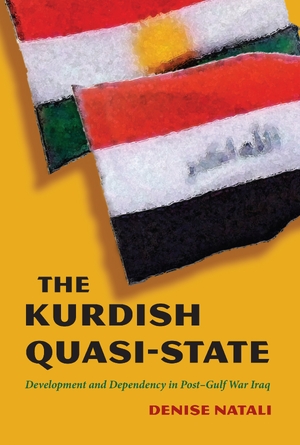"The Kurdistan Regional Government (KRG) is not just one of the most important developments in the Middle East, but it is also an important experiment in state building. Natali, who has been able to observe the evolution of the KRG from its inception, provides a sophisticated analytical approach to its institutionalization, shortcomings, and successes. Changing international boundaries will make this book a must for scholars working on similar cases."—Henri J. Barkey, editor of Reluctant Neighbor: Turkey's Role in the Middle East
"An insightful, empathetic, and comprehensive analysis of political, social, and economic change that has occurred in the Kurdish Regional Government (KRG) since 1991, but especially after 2003. Drawing upon a wide variety of source materials, including extensive interviews in the KRG, Natali presents the most comprehensive analysis to date of the political and economic change that has transformed the Kurds from a marginal to a central player in post-2003 Iraqi politics."—Eric Davis, author of Memories of State: Politics, History, and Collective Identity in Modern Iraq
Description
Despite ongoing instability and underdevelopment in post-Saddam Iraq, some parts of the country have realized relative security and growth. The Kurdish north, once an isolated outpost for the Iraqi army and local militia, has become an internationally recognized autonomous region. In The Kurdish Quasi-State, Natali explains the nature of this transformation and how it has influenced the relationship between the Kurdistan region and Iraq’s central government.
This much-needed scholarship focuses on foreign aid as helping to create and sustain the Kurdish quasi-state. It argues that the generous nature of external assistance to the Kurdistan region over time has given it new forms of legitimacy and leverage in the country. Since 2003 the Kurdistan region has gained representation in the central government and developed commercial, investment, and political ties with regional states and foreign governments.
Drawing on extensive field research, Natali explores how this transition has had positive and unintended consequences on Kurdish—state relations. Greater complexity in the regional political economy has demanded new forms of compromise with the central government. The Kurdistan region may have become a distinct political entity that challenges Baghdad; however, the benefits of aid and logic of quasi-statehood ensure that it will remain part of Iraq.
Acutely familiar with the nuances of Kurdish politics, society, and culture, Natali has produced a timely and immensely important book for policy makers, scholars, and practitioners interested in the region.
About the Author
Denise Natali is the Academic Dean of Students and Research Centers Director at the American University of Iraq-Sulaimani. Over the past eighteen years she has conducted independent field research in the Kurdish regions of Iraq, Turkey, Iran, and Syria and is the author of numerous publications on Kurdish nationalism, politics, and identity, including The Kurds and the State: Evolving National Identity in Iraq, Turkey, and Iran.
Series: Modern Intellectual and Political History of the Middle East
6 x 9, 192 pages, 16 black and white illustrations
August 2010

